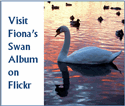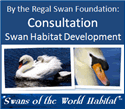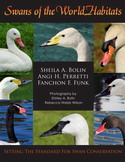Ask the Swan Specialist
Date: 4 February 2017
Dear Concerned:
We would love to see your research that documents that the Mute Swans are detrimental to the environment or other waterfowl/wildlife. The erroneous points you make are the same that have been intentionally spewed by state and federal wildlife officials since the 1980's when wildlife officials and hunters developed a plan to rid the U.S. of Mute Swans so that the larger Trumpeter Swans could be introduced into areas for Trophy Waterfowl hunting purposes. These same officials stated that this was not the case, yet in 2014, Minnesota issued the first hunting permits of Trumpeter Swans (which were introduced at taxpayer cost) to Native Americans. Immediately, following this permit, biologists were asked if the number of Trumpeter Swans could now sustain hunting to the general public.
The points that you make regarding detrimental to the habitat and wildlife have been dispelled and disputed by valid reliable scientific research as well as by international swan and wetland habitat specialists.
The Mute Swan is a native bird to North America as fossils have been found in several sites. Also, the science quoted by wildlife officials that these birds are detrimental has been shown to be misquoted, non-existent in most instances or shoddy research provided by various entities receiving grants to specifically target Mute Swans in a negative manner.
Mute Swans are regarded (again through valid reliable scientific research) as a Sentinel/indicator species that alerts scientists to problems in the habitat such as the presence of heavy metals and harmful microorganisms. Furthermore, research also shows that the Mute Swans increase the amount of macrophytes and biodiversity in the habitat. Because Mute Swans can reach into areas that dabbling ducks and other such waterfowl cannot reach, the swans bring needed food resources to the top of the water so that this type of waterfowl and others can feed.
Furthermore, in 2014, at the International Swan Symposium, state and federal wildlife officials admitted that they had never conducted any environmental impact assessment of Mute Swans in the U.S. (meaning they had no valid reliable research) nor had they ever conducted a systemic collaborative count of Mute Swans in the U.S.
This means that the misrepresentation of Mute Swans expanding in population or being detrimental has not been substantiated.
It is after 20 years of killing Mute Swans, introducing Trumpeter Swans in areas that they never before existed, and hoodwinking the public at severe cost to the taxpayer, this hoax is now being brought to light. In fact, state wildlife officials in Michigan stated that the program was costly to the taxpayer and is not sustainable.
These statements as well as valid reliable research caused the New York state Senate and Assembly to stop the killing of Mute Swans in NY until such research could be presented.
Clearly, something is wrong with the pond if there is no other waterfowl in the area of the Mute Swans as research again, clearly shows that their presence increases biodiversity in the habitat.
So, again, we would love to see any valid reliable research that you may produce that disputes the current valid reliable research and statements by worldwide swan and wetland habitat specialists. The Regal Swan
Messages In This Thread
- Mute Swan Hunting in NJ -- Maya -- 8 June 2016
- Re: Mute Swan Hunting in NJ -- The Regal Swan -- 8 June 2016
- Re: Mute Swan Hunting in NJ -- concerned -- 4 February 2017
- Re: Mute Swan Hunting in NJ -- The Regal Swan -- 4 February 2017
- Re: Mute Swan Hunting in NJ -- concerned -- 4 February 2017
- Re: Mute Swan Hunting in NJ -- The Regal Swan -- 8 June 2016
Ask the Swan Specialist is powered by
Tetra-WebBBS 5.30 Beta © 2006-2007 Tetra-Team






